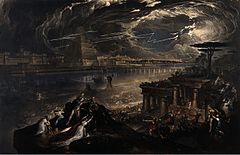The Destruction of Sodom and Gomorrah
| The Destruction of Sodom And Gomorrah | |
|---|---|
 | |
| Artist | John Martin |
| Year | 1852 |
| Medium | oil on canvas |
| Dimensions | 136.3 cm × 212.3 cm (53.7 in × 83.6 in) |
| Location | Laing Art Gallery, Newcastle upon Tyne |
The Destruction of Sodom and Gomorrah is a painting by the English painter John Martin from 1852.
John Martin's painting, shows the biblical story of the destruction of the two cities of Sodom and Gomorrah, which was God's punishment for the two cities for people's immoral behavior. Only Lot and his daughters were saved. Lot's wife disobeyed God's instruction not to look back, and was turned into a pillar of salt. The fiery red color is characteristic of John Martin's dramatic scenes of destruction. The swirling storm in heaven was also a frequent feature of his paintings.
Description
[edit]It is 136.3 x 212.3 cm. in size. It is in the collection of the Laing Art Gallery in Newcastle upon Tyne.[1]
Apocalyptic theme
[edit]Several other of Martin's paintings contain apocalyptic tendencies, including the Fall of Babylon (1831), The Fall of Nineveh, Divine vengeance, Pandemonium (1841) and The Eve of the Deluge (1840).[2][3]
-
The Fall of Babylon, 1831
-
Syndfloden, 1834, Yale Center for British Art
-
The Eve of the Deluge, 1840, den kongelige samling på Windsor Castle
-
Pandemonium, 1841, Louvre
Artist
[edit]Many regarded Martin while he lived as a great British artist, surpassed only by his older contemporary colleague J. M. W. Turner, who he had a competition with for recognition. But John Martin's reputation declined after his death.[3][2][4]
References
[edit]- ^ "The Destruction of Sodom and Gomorrah". europeana.eu. Retrieved 3 May 2016.
- ^ a b "John Martin: the Laing Gallery, Newcastle". Telegraph.co.uk. 15 March 2011. Retrieved 3 May 2016.
- ^ a b "How John Martin saw the end of the world – TLS". the-tls.co.uk. Retrieved 3 May 2016.
- ^ Mark Brown (4 March 2011). "Derided painter John Martin makes a dramatic comeback". the Guardian. Retrieved 3 May 2016.




